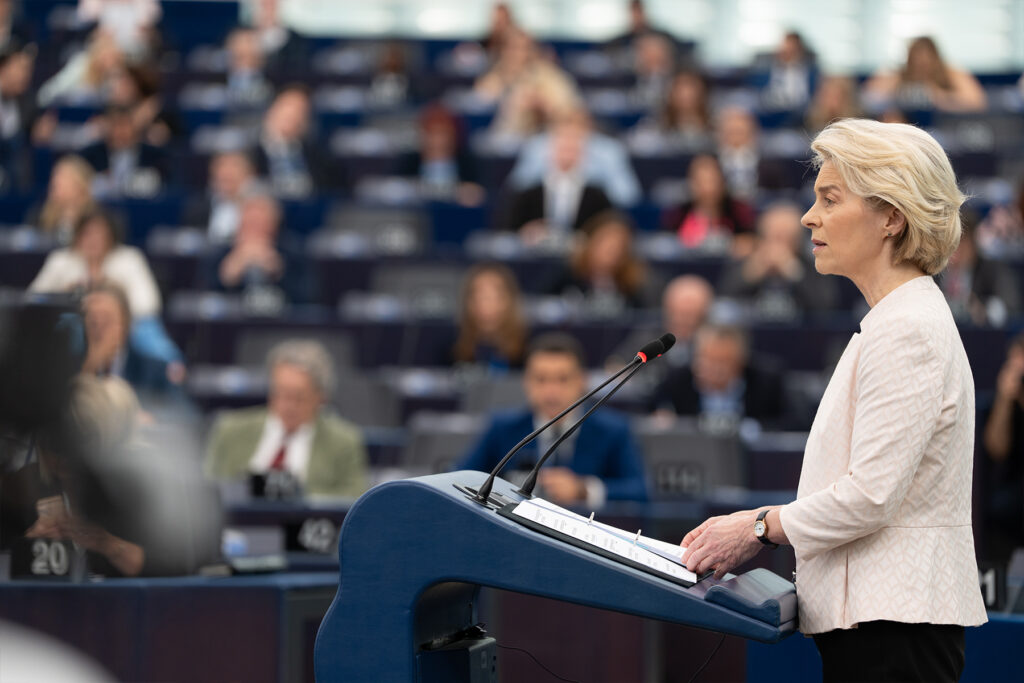The biotechnology associations EuropaBio and Bio Deutschland were apparently prompted to recall Ursula von der Leyen’s (EPP) speech before her confirmation as EU Commission President, in which there was no mention at all of biotechnology, which had been much touted during her previous term. In the European Parliament, Ursula von der Leyen won an absolute majority with 401 votes out of 719, and delivered a speech setting out new priorities after the previous Parliament’s Green Deal.
Military equipment to equip Europe with an air defense system capable of fighting against foreign enemies of democracy even without the United States, a tripling of the border patrol mercenary force Frontex (already the best-funded in the EU with well over €2 billion invested), and a doubling of the EU police force Europol are intended to prevent border crossings and uncontrolled migration.
In addition to arming Europe against internal and external threats to democracy, such as the strengthening of the far-right in the European Parliament, the EU politician announced the replacement of the previous Green Deal with a Clean Industry Deal, which confirms the EU Green Deal’s 90% decarbonization target by 2040, but makes “prosperity and competitiveness a top priority.” To make up for Europe’s lag behind China and the United States in many innovation areas, von der Leyen promised more bureaucratization, planning security for companies, a financing ecosystem on par with the United States, and a new fund to keep European companies in Europe.
What is most notable about von der Leyen’s speech, at least for biotechnologists, is what was not mentioned. The new European Competitiveness Fund “will focus on joint and cross-border European projects that promote competitiveness and innovation, in particular by supporting the Clean Industry Pact. The fund will ensure the development and manufacturing of strategic technologies in Europe,” von der Leyen said. “From AI to cleantech, the future of our prosperity must be made in Europe.” The fact that biotechnology, which was prioritized as the third strategic pillar of the Green Deal, unlike the highly praised 2023 State of the Union address, is not mentioned in the Green Deal, shows that the biotechnology association is clearly pondering. Especially in light of the Biotechnology Act 2025, announced by Competition Commissioner Margarethe Vestager earlier this summer, which is intended to prioritize funding for the sector.
A congratulatory message from the EU biotechnology lobby, EuropaBio, sounded like singing in the dark forest: “We welcome President von der Leyen’s re-election and her commitment to promote competitiveness, innovation and resilience while fostering a biotechnology revolution to modernize the EU economy. EuropaBio recalled President von der Leyen’s commitments to present an EU biotechnology law in 2025, to support a clean industry pact and to promote, invest and ensure access to cheap, sustainable and safe energy supplies and raw materials for industry, including biotechnology (net-zero technologies).” A few days after President von der Leyen’s speech, the German biotechnology association BIO Deutschland published a position statement entitled “The biotechnology economy: Action recommendations towards a sustainable economy based on biotechnology”, highlighting the importance of biotechnology in building a sustainable economy.
The prospect of strengthening EU farmers, as expressed in von der Leyen’s speech, also sounds like a take on the topic of “strengthening traditional agriculture” advocated by far-right national leaders such as Viktor Orbán and Giorgia Meloni. Just to be sure: at the EU Council of Agriculture Ministers in mid-July, the Hungarian presidency expressed its intention to radically re-discuss the issue of new genomic technologies (NGT). Hungary has always voted against any proposed deregulations at the Council of Agriculture Ministers. Just as Italy had already established and was attacked by the former EU Commission, Orbán wants to ban the sale of cell-based foods, whose nutritional profile and CO2 footprint have been optimized with biotechnology and which are penetrating the global market, especially in Asia and the United States.
It is positive that von der Leyen has agreed to allow climate-neutral fuels into the planned ban on internal combustion engines in newly registered cars and heavy goods vehicles from 2035. Overall, she is talking about technology openness. It will be interesting to see what the new Commissioner means by this.

